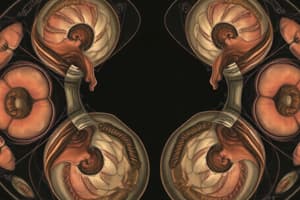Podcast
Questions and Answers
What is the primary reason for cell division in living organisms?
What is the primary reason for cell division in living organisms?
- To increase the size of each cell
- To allow cells to store more nutrients
- To enable growth by producing more cells (correct)
- To facilitate the aging process
What is the role of DNA during cell division?
What is the role of DNA during cell division?
- To eliminate waste products
- To replicate itself for distribution to daughter cells (correct)
- To create energy for cell activities
- To control the size of the cells
What structure forms when chromatin coils up and duplicates itself?
What structure forms when chromatin coils up and duplicates itself?
- Centromeres
- Chromosomes (correct)
- Chromatids
- Nucleotides
In which type of reproduction do unicellular organisms primarily engage through cell division?
In which type of reproduction do unicellular organisms primarily engage through cell division?
What happens to sister chromatids during cell division?
What happens to sister chromatids during cell division?
What is the primary purpose of mitosis in somatic cells?
What is the primary purpose of mitosis in somatic cells?
During which phase of the cell cycle does DNA replication occur?
During which phase of the cell cycle does DNA replication occur?
How many chromosomes do human somatic cells typically contain?
How many chromosomes do human somatic cells typically contain?
What is true about the chromosome number in somatic cells of any organism?
What is true about the chromosome number in somatic cells of any organism?
Which of the following statements about a fruit fly's chromosomes is correct?
Which of the following statements about a fruit fly's chromosomes is correct?
What is the correct order of the phases of mitosis?
What is the correct order of the phases of mitosis?
During which phase do spindle fibers connect to chromosomes?
During which phase do spindle fibers connect to chromosomes?
What describes the difference between benign and malignant tumors?
What describes the difference between benign and malignant tumors?
What occurs during Telophase?
What occurs during Telophase?
What is the role of cytokinesis?
What is the role of cytokinesis?
What happens to chromosomes during Anaphase?
What happens to chromosomes during Anaphase?
What is indicated by the presence of a cell plate during cytokinesis?
What is indicated by the presence of a cell plate during cytokinesis?
Which stage of the cell cycle follows mitosis and cytokinesis?
Which stage of the cell cycle follows mitosis and cytokinesis?
What characteristic defines cells that have experienced DNA mutations leading to uncontrolled division?
What characteristic defines cells that have experienced DNA mutations leading to uncontrolled division?
What is a characteristic of cancer as a disease?
What is a characteristic of cancer as a disease?
Flashcards are hidden until you start studying
Study Notes
Cell Division Overview
- Cell division produces two new cells (daughter cells) from one original cell (parent cell).
- Necessary for growth, tissue repair, and nutrient management within cells.
Importance of Cell Division
- Organisms grow by increasing cell number, not cell size.
- Cell division repairs damaged tissues effectively.
- Large cells struggle with nutrient intake and waste removal.
DNA and Chromosomes
- DNA, located in the nucleus, controls all cellular activities, including division.
- In non-dividing cells, DNA is in the form of chromatin; during division, it condenses into chromosomes.
- Chromosomes consist of two identical sister chromatids connected at a centromere.
Chromosome Numbers
- Each species has a specific chromosome count:
- Humans: 46 chromosomes (23 pairs)
- Dogs: 78 chromosomes (39 pairs)
- Goldfish: 94 chromosomes (47 pairs)
- Lettuce: 18 chromosomes (9 pairs)
- Somatic cells (body cells) maintain a stable chromosome number.
Cell Cycle Phases
- Comprises interphase (growth and replication), mitosis (nuclear division), and cytokinesis (cell division).
Interphase
- Cells grow, replicate DNA, and organize organelles during this phase.
- Interphase accounts for most of the cell's lifecycle.
Mitosis Phases (PMAT)
- Prophase: Chromosomes coil, the nuclear envelope disappears, spindle fibers form.
- Metaphase: Chromosomes align in the cell's middle; spindle fibers attach to each chromosome.
- Anaphase: Sister chromatids are pulled apart to opposite poles of the cell.
- Telophase: Chromosomes uncoil, nuclear envelopes reform, and two new nuclei develop.
Cytokinesis
- Divides the cytoplasm and organelles after mitosis.
- In animal cells, the cytoplasm pinches in; in plant cells, a cell plate forms.
Cell Division Control
- DNA regulates the cell cycle and division process.
- Damaged DNA can lead to uncontrolled cell division, resulting in tumors.
Tumors
- Benign tumors: Non-cancerous, do not spread.
- Malignant tumors: Cancerous and can invade other tissues (metastasis).
Cancer
- Represents a collection of over 100 diseases with various types and characteristics.
Studying That Suits You
Use AI to generate personalized quizzes and flashcards to suit your learning preferences.




